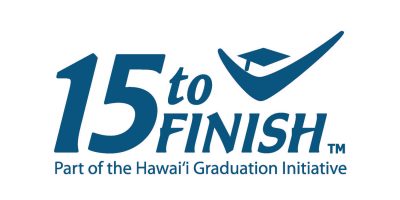
About 15 to Finish
15 to Finish is a campaign of the University of Hawaiʻi’s Hawaiʻi Graduation Initiative. The campaign encourages students attending or planning to attend the University’s two or four-year campuses to take 15 credits per semester to graduate on time. Check out this TV spot encouraging taking 15 credits produced by the 55 by ’25 campaign.
Why 15 to Finish
- You’re more likely to graduate on time.
- Research has shown you’re more likely to get better grades.
- If you attend a 4-year college, you’ll save money, since taking 15 credits is the same cost as taking 12 credits. You’re getting 3 credits for FREE!
- By finishing on time, you have more options. You can get an advanced degree, take time off to travel or volunteer, or start working full-time.
- On average, residents in Hawaiʻi with a bachelor’s degree earned more than $52,000 per year and had a 4.5% unemployment rate. Those earning an associate degree earned more than $43,500 per year and had a 4.6% unemployment rate. Compare that to the average annual earnings of those who finished high school but did not earn a degree—just over $33,000, with a 6.2% unemployment rate. It pays to earn your degree, and earning it faster means you’ll make more money over the span of your career.
Contact
1633 Bachman Place
Sinclair Annex 1, Room 7
Honolulu, HI 96822
(808) 956-9404
avpapp@hawaii.edu


What Can You Do to Get on Board
Commit
College is a commitment. Earning 15 credits per semester may not be easy, but it will give you the advantage of graduating on time and getting ahead. Know the courses you need to graduate, and meet with your advisor to map out a plan to earn your degree on time.
Work on Campus
If you have to work, consider working on campus while taking 15 credits. You’ll have more flexibility in your schedule and will have a shorter commute time than if you work off campus.
English & Math
Be ready for freshman English and Math, and take these courses as part of your first year of college. Students who take 15 credits per semester and complete their English and Math courses early are more likely to graduate on time.
Student Aid
Fill out a FAFSA (Free Application for Federal Student Aid), the application used by nearly all colleges and universities to determine eligibility for federal, state, and college-sponsored financial aid, including grants, educational loans, and work-study programs. You may be eligible for grants and free gift aid which do not have to be paid-back. With financial assistance, you can concentrate on your studies, work fewer hours and finish college faster.
Be Proactive
Be proactive and ask for help. On campus, you’re surrounded with people and resources with the purpose of helping you get your degree. Ask for help from professors, teaching assistants, academic advisors and even fellow students when you need it.
Summer Courses
Take summer classes! Even if you can’t take 15 credits a semester, take summer classes to stay on track.
Check STAR
STAR is UH’s degree audit check, which maps your pathway to graduation at all times. You can also do a “What If” function if you’re considering to change your major.
For Parents and Public
Data
- By 2020, 70% of jobs in Hawaiʻi will require a career certificate or a college degree 44% of adults in Hawaiʻi currently have an associates degree or higher, leaving a gap of 26%.
- Did you know that out of 100 students who enroll in public college or university:
- 29 attend a 4-year public college as a full-time, bachelor’s degree-seeking student. Of these, 24 will return to college as a sophomore, and just 5 will graduate on time (4 years), while 11 will graduate in 6 years and 2 in 8 years.
- 46 will attend a 2-year public college as a full-time, associates degree-seeking student. Of these, 31 will return to college as a sophomore, and just 2 will graduate on time (2 years), while 5 will graduate in 3 years and 3 in 4 years.
- For too many students, the path to college ends with no degree—and often lots of debt.
- For the first time in our history, the current generation of college-age Americans will be less educated than their parents’ generation—unless things change quickly.
- Full-time students attending the University of Hawaiʻi’s 2 or 4-year campuses need to earn 15 credits or more per semester to graduate on time. Students who have a plan to earn 15 credits per semester are more likely to complete college on time, earn better grades and have higher completion rates than students who are not on track to graduate on time.
- Data shows that time, not tuition, is the enemy of college completion. The longer it takes to graduate, the more life gets in the way and the less likely that one will ever graduate. According to the National Center for Education Statistics, less than half of U.S. college students graduate. (Washington Post, Feb. 4, 2012)
- At the University of Hawaiʻi’s four-year campuses, a full-time student earning 15 credits per semester does not pay more tuition than a student earning 12 credits per semester. Taking 15 credits not only saves money, but also puts the student on track to earn their degree and start their career sooner than those who take longer to graduate. Currently in Hawaiʻi, on average, full-time students take 5.4 years to earn a 4-year degree.
- At the University’s community colleges, students pay by the credit, but they are also encouraged to take 15 credits per semester to earn their degree in 2-years. Currently in Hawaiʻi, on average, full-time students take 5.1 years to earn a 2-year degree. Those who graduate with a degree in 2 years not only save time, but they also start their careers sooner than those who take longer to graduate.

